I need to thank you, since I was part of your program and finished it, I haven't use any type of drugs. I remember everything you taught me, and I fight every day to maintain my sobriety because I'm proud of how far I've come, but I'm sure that none of this could be possible ...
About Long Island Center For Recovery
What sticks out to me the most is their holistic approach to treatment and the variety they utilize specifically to heal the mind, body and spirit. During the beginning stages of the road to recovery, it becomes a very different lifestyle transition and taking care of your well-being becomes one of the main focuses.
Their nutritional counseling helps you create more balance in your diet and will give you practical tips to help you adopt eating habits. They will show you how to create healthy and tasty meals and guide you with creating a healthier diet, which can help with disease management, improve your mood, and boost energy.
Yoga therapy can help with improving memory and cognitive function. It also assists with pain management, creates mindfulness and alleviates stress. Yoga also works wonders for your body like improving flexibility, boosting blood circulation and reducing arthritis. Yoga can be an activity that can be done by yourself and with your loved ones encouraging you to remember how important it is to maintain self-care weekly.
Drum therapy is another therapy that can also be fun. In the beginning, you will make the same sound with the drums and match it to your heartbeat. This alone creates theta waves in the brain motivating multiple brain wave patterns. This helps with releasing emotional trauma, can encourage spirituality, create community, and assist with relaxation.
Facility Overview
Latest Reviews
Rehab Score
Gallery
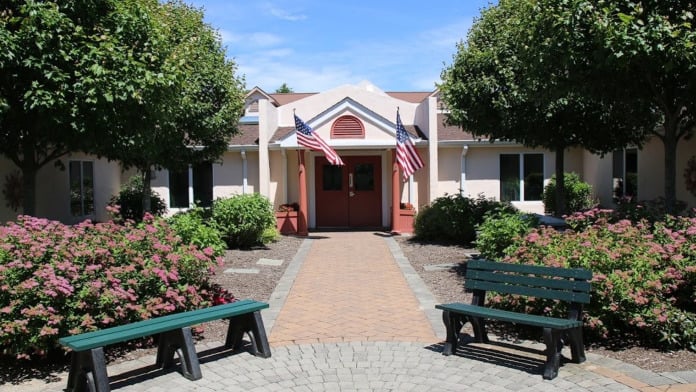
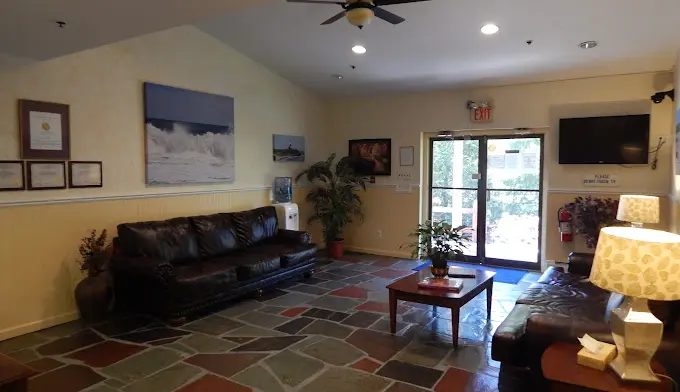
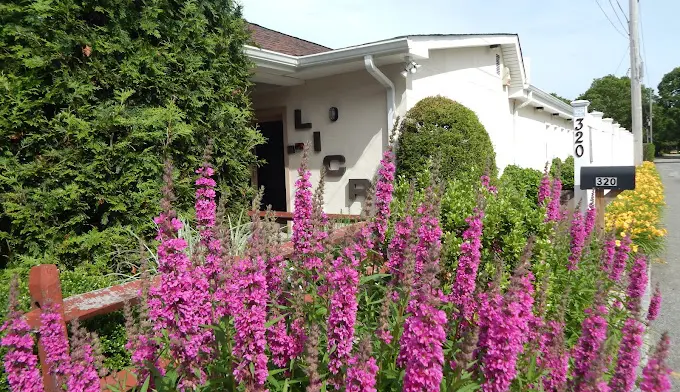
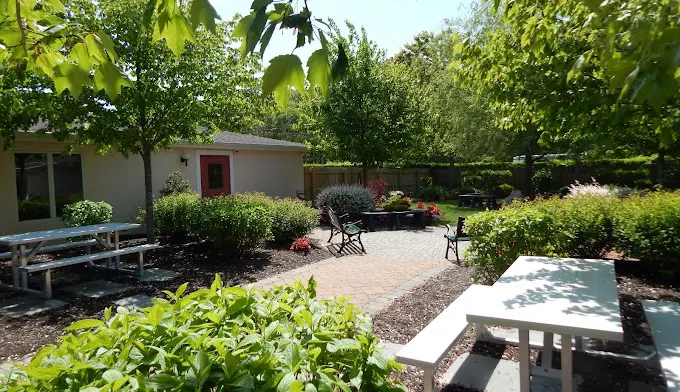
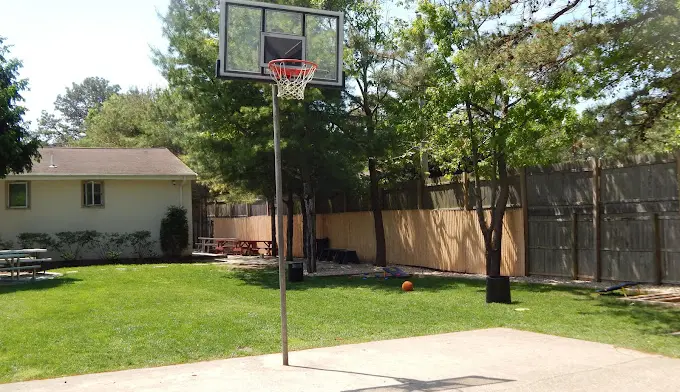
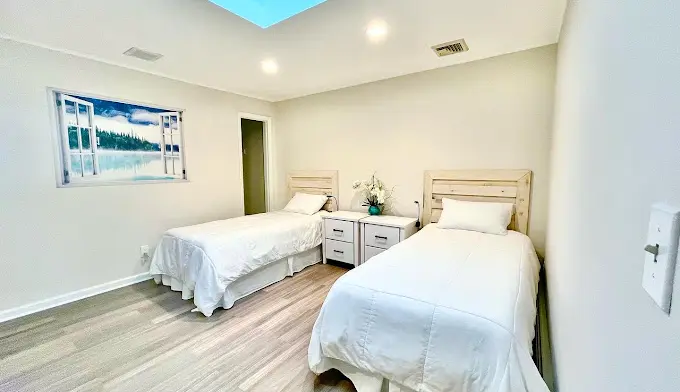
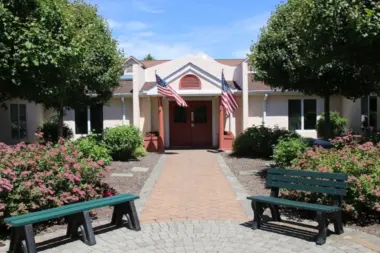

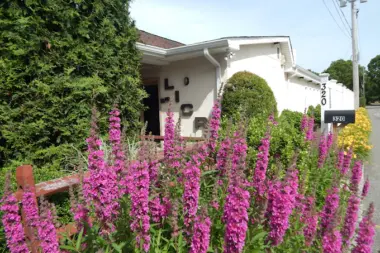
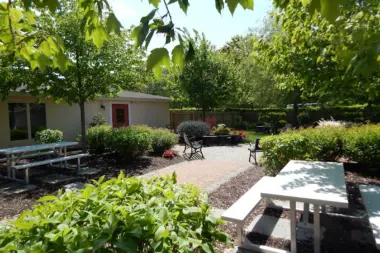
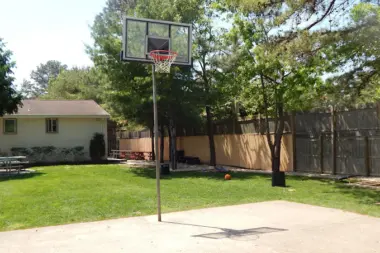

Accepted Insurance



Other Forms of Payment
Private insurance refers to any kind of healthcare coverage that isn't from the state or federal government. This includes individual and family plans offered by an employer or purchased from the Insurance Marketplace. Every plan will have different requirements and out of pocket costs so be sure to get the full details before you start treatment.
Self-pay involves paying for treatment out of your own pocket. You can use savings or credit, get a personal loan, or receive help from family and friends to fund your treatment. If you don't have insurance or your insurance plan doesn't cover a specific program, self-pay can help ensure you still get the care you need.
Military members, veterans, and eligible dependents have access to specific insurance programs that help them get the care they need. TRICARE and VA insurance can help you access low cost or no cost addiction and mental health treatment. Programs that accept military insurance often have targeted treatment focused on the unique challenges military members, veterans, and their families face.
Addiction Treatments
Levels of Care
Drug and alcohol addiction often takes a heavy toll on one's body. Over time, a physical dependence can develop, meaning the body physiologically needs the substance to function. Detox is the process of removing drugs and/or alcohol from the body, a process that can be lethal if mismanaged. Medical detox is done by licensed medical professionals who monitor vital signs and keep you safe, healthy, and as comfortable as possible as you go through detox and withdrawal.
Inpatient addiction treatment also known as residential addiction treatment is offered at Long Island Center for Recovery for clients in need of intense treatment program or one that is in a controlled environment. Admission into this program is often recommended to clients who have a moderate to severe addiction problem. Inpatient drug rehab can last around 30 (the most common length of stay) days, and many clients admitted to this program often undergo a period of detoxification first. Long Island Center for Recovery Residential Rehab program provides 24-hour supervised care by licensed addiction treatment specialists, mental health counselors and social workers. Residing at the facility provides the benefit of receiving a comprehensive set of addiction treatment services to treat the body, mind and spirit.
At certain points in the recovery process, it's important to have support available 24/7. 24-hour clinical care offers a safe environment in which to recover from drug or alcohol addiction in peace, knowing medical detox and other treatment will happen with professionals on hand.
12-step programs are addiction recovery models based on Alcoholics Anonymous (AA). A number of substance abuse programs (including some drug and alcohol rehab centers) use the 12 steps as a basis for treatment. Beginning steps involve admitting powerlessness over the addiction and creating a spiritual basis for recovery. Middle steps including making direct amends to those who've been hurt by the addiction, and the final step is to assist others in addiction recovery in the same way. 12-Step offshoots including Narcotics Anonymous (NA), Cocaine Anonymous (CA), Dual Recovery Anonymous (DRA), Sex and Love Addicts Anonymous (SLAA) and Gamblers Anonymous (GA).
Completing a drug or alcohol rehab program shouldn't spell the end of substance abuse treatment. Aftercare involves making a sustainable plan for recovery, including ongoing support. This can include sober living arrangements like halfway houses, career counseling, and setting a patient up with community programs like Alcoholics Anonymous (AA) or Narcotics Anonymous (NA).
Treatments
The goal of treatment for alcoholism is abstinence. Those with poor social support, poor motivation, or psychiatric disorders tend to relapse within a few years of treatment. For these people, success is measured by longer periods of abstinence, reduced use of alcohol, better health, and improved social functioning. Recovery and Maintenance are usually based on 12 step programs and AA meetings.
When you choose drug rehab in New York, you'll participate in a variety of treatments that are designed to help you live a drug-free lifestyle. Common methods of treatment include group, individual, and family counseling, medication management, nutrition, exercise, and management of co-occurring mental health disorders.
Many of those suffering from addiction also suffer from mental or emotional illnesses like schizophrenia, bipolar disorder, depression, or anxiety disorders. Rehab and other substance abuse facilities treating those with a dual diagnosis or co-occurring disorder administer psychiatric treatment to address the person's mental health issue in addition to drug and alcohol rehabilitation.
A combined mental health and substance abuse rehab has the staff and resources available to handle individuals with both mental health and substance abuse issues. It can be challenging to determine where a specific symptom stems from (a mental health issue or an issue related to substance abuse), so mental health and substance abuse professionals are helpful in detangling symptoms and keeping treatment on track.
Opioid rehabs specialize in supporting those recovering from opioid addiction. They treat those suffering from addiction to illegal opioids like heroin, as well as prescription drugs like oxycodone. These centers typically combine both physical as well as mental and emotional support to help stop addiction. Physical support often includes medical detox and subsequent medical support (including medication), and mental support includes in-depth therapy to address the underlying causes of addiction.
Programs
Adult rehab programs include therapies tailored to each client's specific needs, goals, and recovery progress. They are tailored to the specific challenges adult clients may face, including family and work pressures and commitments. From inpatient and residential treatment to various levels of outpatient services, there are many options available. Some facilities also help adults work through co-occurring conditions, like anxiety, that can accompany addiction.
Long Island Center for Recovery offers specialized addiction treatment for first responder professionals such as law enforcement, firefighters, military, Veterans, EMT’s and Correctional officers.Their first responder therapeutic addiction treatment program is dedicated to the exceptional needs of our uniformed professionals, treating not only the addiction but also the underlying issues that are often associated to such high-demand professions, namely stress, anxiety, depression, and Post Traumatic Stress Disorder (PTSD).
Young adulthood can be an exciting, yet difficult, time of transition. Individuals in their late teens to mid-20s face unique stressors related to school, jobs, families, and social circles, which can lead to a rise in substance use. Rehab centers with dedicated young adult programs will include activities and amenities that cater to this age group, with an emphasis on specialized counseling, peer socialization, and ongoing aftercare.
Recovery is most successful when clients feel accepted and validated by their peers and treatment providers. Facilities that offer LGBTQ-inclusive programming are committed to creating a safe space where everyone can grow and recover without fear of judgment or discrimination. They will have dedicated policies in place to create a safe and supportive environment that fosters free expression.
Clinical Services
Cognitive Behavioral Therapy (CBT) is a therapy modality that focuses on the relationship between one's thoughts, feelings, and behaviors. It is used to establish and allow for healthy responses to thoughts and feelings (instead of unhealthy responses, like using drugs or alcohol). CBT has been proven effective for recovering addicts of all kinds, and is used to strengthen a patient's own self-awareness and ability to self-regulate. CBT allows individuals to monitor their own emotional state, become more adept at communicating with others, and manage stress without needing to engage in substance abuse.
Whether a marriage or other committed relationship, an intimate partnership is one of the most important aspects of a person's life. Drug and alcohol addiction affects both members of a couple in deep and meaningful ways, as does rehab and recovery. Couples therapy and other couples-focused treatment programs are significant parts of exploring triggers of addiction, as well as learning how to build healthy patterns to support ongoing sobriety.
Creativity is inherently healing, and can help those in recovery express thoughts or feelings they might not otherwise be able to. Creative arts therapy can include music, poetry/writing, painting, sculpting, dance, theater, sandplay, and more. Unlike traditional art, the final product matters far less than the experience of creation and expression itself.
Dialectical Behavior Therapy (DBT) is a modified form of Cognitive Behavioral Therapy (CBT), a treatment designed to help people understand and ultimately affect the relationship between their thoughts, feelings, and behaviors. DBT is often used for individuals who struggle with self-harm behaviors, such as self-mutilation (cutting) and suicidal thoughts, urges, or attempts. It has been proven clinically effective for those who struggle with out-of-control emotions and mental health illnesses like Borderline Personality Disorder.
Equine therapy, aka equine-assisted therapy (EAT), is a form of experiential therapy that involves interactions and activities with horses. It does not necessarily involve riding horses, but all activities related to horses, such as feeding, grooming, haltering and leading them. A mental health professional frequently oversees the activities (often in conjunction with a horse professional), and helps patients process their thoughts, feelings, and behavior patterns during and/or after the interaction.
Recreational Counseling at Long Island Center for Recovery (LICR) plays an important role in addiction treatment. It encourages clients to participate in the treatment’s recreational therapeutic activities and helps them to develop their own recreational pattern. Participating in recreational activities at Long Island Center for Recovery may involve a combination of both physical fitness and leisure activities.
EMDR is a therapeutic modality originally developed to help process trauma. In an EMDR session, a patient is prompted to undergo eye movements that mimic those of REM sleep. This is accomplished by watching a therapist's finger move back and forth across, or following a bar of light. The goal is repetitive sets of eye movements that help the brain reprocess memory, which can significantly reduce the intensity of remembered traumatic incidents. Associated memories can heal simultaneously, leaving patients significantly calmer, more stable, and more emotionally relaxed.
Families who struggle with addiction problem experienced by a member of the family can benefit significantly from family education and counseling therapies. These therapies are designed to help both the individual and their loved ones heal from addiction by structuring an interpersonal support network while receiving intensive therapeutic treatment services. Family education and counseling also aims to improve unhealthy interactions between family members by teaching effective communication skills and techniques, helping the family reach a better level of understanding of their individual needs, and repair any damages caused by previous confrontations or conflicts between family members.
Group therapy is one of the most widely practiced treatment methods in both inpatient and outpatient addiction treatment programs. It engages its participants by directing them through experiences, training them in acquiring a new set of techniques, or skills needed to solve problems related to their addiction. In group therapy, one or more therapists work with a small group of individuals to facilitate discussions as members share their experiences of how they are dealing with their addiction.
Individual therapy is a common therapeutic approach utilized in both inpatient and outpatient addiction treatment programs. Also known as Psychotherapy, talk therapy, or counseling, this therapy is specifically designed to help individuals identify, understand and learn how to solve issues that are related to their substance abuse and addiction. The overall focus of individual therapy is to help individuals make positive behavioral changes using newly learned skills and coping strategies to avoid relapse.
Motivational Interviewing (MI) is a clinical approach to helping people with substance abuse issues and other conditions shift behavior in positive ways. It is more goal-oriented than traditional psychotherapy, as MI counselors directly attempt to get clients to consider making behavioral change (rather than wait for them to come to conclusions themselves). Its primary purpose is to resolve ambivalence and help clients become able to make healthy choices freely.
Nicotine Replacement Therapy (NRT) is a way of getting nicotine into the bloodstream without smoking. It uses products that supply low doses of nicotine to help people stop smoking. The goal of therapy is to cut down on cravings for nicotine and ease the symptoms of nicotine withdrawal.
Nutrition therapy, aka medical nutrition therapy (MNT), is a way of treating physical, emotional, and medical conditions through diet. Specific dietary plans are designed by professional nutritionists or registered dietitians, and patients follow them in order to positively affect their physical and mental health.
Recreational therapy (aka therapeutic recreation) uses creative and fun activities to help with addiction recovery. Recreational therapists lead patients in entertaining and engaging activities like sports or games; art (drawing, painting, sculpture); drama, music, and dance; and/or community outings (field trips) to improve patients' physical, social, and emotional well-being.
Many individuals who struggle with substance abuse and addiction suffer from a past trauma as well. Addiction and trauma are known to be closely linked, and alcohol and drugs are often utilized in self-medication for individuals to escape from their troubling and painful past. When a client seeks addiction treatment at Long Island Center for Recovery and is diagnosed with a co-occurring disorder that is shown to be related to traumatic past event or events, specific therapeutic treatments are added to the rehab program. This additional trauma specific treatment will address the unresolved past trauma and clear the related painful and disturbing memories.
Amenities
-
Private Setting
-
Yoga Studio
-
Hiking
Staff & Accreditations
Staff
Shawn Hamilton
CEO
Helen Pecoraro
Director, Financial
Danny Cervini
Director Of Admissions
Accreditations

LegitScript has reviewed Long Island Center For Recovery as part of their certification program, and has determined that it meets the LegitScript standards for legality, safety and transparency.
LegitScript verified in

The Joint Commission, formerly known as JCAHO, is a nonprofit organization that accredits rehab organizations and programs. Founded in 1951, the Joint Commision's mission is to improve the quality of patient care and demonstrating the quality of patient care.
Joint Commission Accreditation: Yes
Accreditation Number: 86878
Contact Information
320 West Montauk Highway
Hampton Bays, NY 11946




